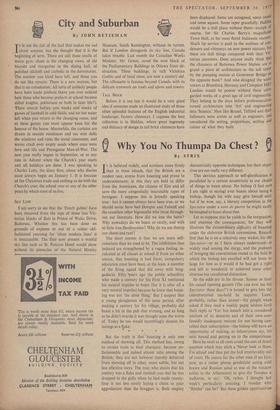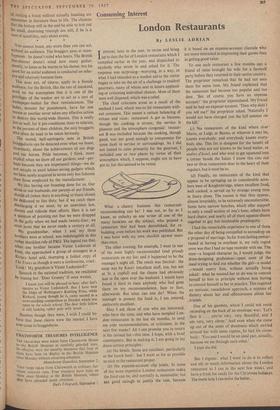Why You No Thumpa Da Chest ?
By STRIX
T IS believed widely, and nowhere more firmly I than in these islands, that the British are a modest race, averse from boasting and prone to understatement; in this they are held to differ from the Americans, the citizens of Eire and all save the more congenitally inscrutable types of foreigner. I suppose this is broadly speaking true : but it cannot always have been true, or we should never have had Hotspur and Falstaff and the countless other bigmouths who recur, through- out our literature. How did we lose the habit? Why nowadays do we boast so rarely,• and with so little true flamboyance? Why do we not thump our chests and rant?
The short answer is that we are more self- conscious than we used to be. The inhibitions thus induced are strengthened by a vague feeling, in- culcated in all classes at school if from no other source, that boasting is bad form; compulsory education must have been, at the least, a member of the firing squad that did away with brag- gadocio. Fifty 'years ago the public schoolboy who made a century for his First XI restrained his natural impulse to boast (for it is after all a very natural impulse) because he knew that boast- ing was not 'the done thing.' But I suspect that a young ploughman of the same period, after making a century for his village, probably did boast a bit in the pub that evening, and as long as he didn't overdo it was thought none the worse of. Today he too would mumblingly dismiss his innings as a fluke. * But the truth is that boasting is only one method of showing off. This method has, owing to certain traits in their character, become un- fashionable and indeed almost tabu among the British; they are not however thereby debarred from showing off in other, more subtle, but not less effective ways. The man who insists that his century was a fluke and reminds you that he was dropped in the gully when he had made twenty- four is not less surely laying a claim to your approbation than the 'braggart is. Both employ diametrically opposite techniques, but their objec- tives are not really very different.
This devious 'approach to self-glorification is paralleled by a certain eccentricity in our choice of things to boast about. No bishop (I feel sure I am right in saying) ever boasts about being a bishop, though his wife may give herself airs; but if he won, say, a literary competition in the Spectator under a /loin de guerre he might easily be tempted to boast about that.
Let us suppose that he yields to the temptation. and examine the consequences; for they will illustrate the extraordinaTy difficulty of boasting under the elaborate British conventions. Remark first that he is on a relatively easy wicket, for the Spectator—or so I have always understood—is widely read among the clergy, and the problem of bringing the conversation round to the field in which the bishop has excelled will not loom so large for him as it would if he had got a right and left at woodcock or achieved some other abstruse but uncultured distinction.
So the odds are in his favour. Sooner or later his casual' opening gambit ('Do you ever see the Spectator these days?') is bound to give him the conversational toe-hold he requires. Later, probably, rather than sooner—for people when asked if they read a weekly paper seldom limit their reply to 'Yes' but launch into a considered analysis of its demerits and of their own con- fessedly inadequate reasons for not having can- celled their subscription—the bishop will have an opportunity of making, as infantrymen say, his next bound and getting on to the competitions.
Here he must at all costs avoid the sort of direct question which may elicit a 'Never look at them, I'm afraid' and thus put the ball irretrievably out of court. He yearns for the other man (I see him, now, as a rather plump geodeticist eating cold brawn and Russian salad at one of the window tables in the Athenaeum) to give the Tempter a walkover, to say : 'Oh, rather. I thought last week's particularly amusing. I wonder who "Bimbo" can be?' But these golden opportunities of flaking a boast without actually boasting are Consuming commoner in literature than in life. The chances that the bishop will in the end be able to trot out his small, disarming triumph are still, if he is a man of sensibility, only about evens.
You cannot boast, any more than you can act, without an audience. The braggart aims at mass- hypnosis : he doesn't mind who hears. The British line-shooter doesn't mind how many gather, silently, to listen as he warms to his theme; but his quest for an initial audience is conducted on selec- tive and relatively humane lines. This does not, of course, apply to a female audience; for the British, like the rest of mankind, work on the assumption that it is one of the privileges of the weaker sex to act as a sort of wastepaper-basket for their reminiscences. The ladies, demons for punishment, have for one reason or another never taken any effective action to destroy this world-wide illusion. This is really just as well, for it pre-conditions them to tolerate, in the persons of their children, the only braggarts who often do need to be taken seriously. The muted, half-apologetic note in British braggadocio can be detected even when we boast, vicariously, about the achievements of our dogs and our horses. Pride becomes, I think, more explicit when we show off our gardens; and—per- haps because they are impersonal things—we do not scruple to extol labour-saving gadgets which We have newly acquired in terms only less fulsome than those employed by the manufacturer. We like having our boasting done for us. Our Wives or our husbands, our parents or our friends, should all (when there is anything to boast about) be dedicated to this duty; but if we catch them discharging it we must, by an unwritten law, disown and ridicule their efforts. Here it is not a question of pointing out that we were dropped in the gully when we had made twenty-four; we must insist that we never made a century at all.
My grandmother, when I and my three brothers were at school, was indefatigable in this rather thankless role of PRO. The legend ran that, when one brother became Victor Ludorum at ton, she approached a group of strangers in a Riviera hotel and, thumping a folded copy of The Times as though it were a tambourine, cried : 'Look! My grandson is Victor Ludendorff!'
Staunch to the national tradition, we retaliated by teasing her. 'Dear Granny' (I once wrote),
I know you will be pleased to hear, after Ian's success as Victor Ludendorff, that I have won
the Duke of Wellington's Knitting Prize, while Richard, young though he is, came second in a newt-catching competition at Datchet which was open to the whole school. The dear little fellow is still looking rather pale with strain. . . . Baseless though they were, I wish I could be- lieve that these claims were the nearest I have ever come to braggadocio.































 Previous page
Previous page